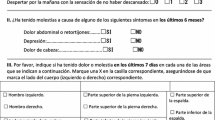Abstract
The aim of the study was to investigate the validity and reliability of the Turkish version of the fatigue severity scale (FSS) in fibromyalgia (FM) patients. Sixty-one FM patients and 54 healthy controls were evaluated using the Turkish version of the FSS. Reliability was investigated using test–retest reliability and internal consistency. Concurrent validity was evaluated between the FSS score and the VAS fatigue. Convergent validity was assessed by comparing the FSS score with the scores of VAS pain, Beck Depression Inventory (BDI), Beck Anxiety Inventory (BAI), and Fibromyalgia Impact Questionnaire (FIQ). Spearman’s rank correlation coefficient was used to evaluate validity. Test–retest reliability and internal consistency of the FSS were excellent in FM patients (ICC: 0.94, Cronbach’s alpha coefficient: 0.85) and in the healthy controls (ICC: 0.90, Cronbach’s alpha coefficient: 0.91). For the concurrent validity, the correlation between the FSS and VAS fatigue was very good in FM group (r: 0.63, P: 0.000) and in the healthy controls (r: 0.94, P: 0.000). For the convergent validity, correlations between the FSS and BDI, BAI, FIQ, pain intensity were moderate to good in both groups (P: 0.000). The Turkish version of the FSS has been proved to be valid and reliable to detect severity of fatigue in FM patients. We recommend the use of it in clinical practice.
Similar content being viewed by others
References
Clauw DJ (2009) Fibromyalgia: an overview. Am J Med 122:3–13
Chong Y-Y, Ng B-Y (2009) Clinical aspects and management of fibromyalgia syndrome. Ann Acad Med Singapore 38:967–973
Mckay PG, Duffy T, Martin CR (2009) Are chronic fatigue syndrome and fibromyalgia the same? Implications for the provision of appropriate mental health intervention. J Psychiatr Ment Health Nurs 16:884–894
Aaron LA, Burke MM, Buchwald D (2000) Overlapping conditions among patients with chronic fatigue syndrome, fibromyalgia, and temporomandibular disorder. Arch Intern Med 160:221–227
Jason LA, Taylor RR, Kennedy CL (2000) Chronic fatigue syndrome, fibromyalgia, and multiple chemical sensitivities in a community-based sample of persons with chronic fatigue syndrome-like symptoms. Psychosom Med 62:655–663
Anton HA, Miller WC, Townson AF (2008) Measuring fatigue in persons with spinal cord injury. Arch Phys Med Rehab 89:538–542
Herlofson K, Larsen JP (2002) Measuring fatigue in patients with Parkinson’s disease–the fatigue severity scale. Europ J Neurol 9:595–600
Hewlett S, Hehir M, Kirwan JR (2007) Measuring fatigue in rheumatoid arthritis: a systematic review of scales in use. Arth Rheum 57:429–439
Hjollund NH, Andersen JH, Bech P (2007) Assessment of fatigue in chronic disease:a bibliographic study of fatigue measurement scales. Health Qual Life Outcomes 5:12–17
Dittner AJ, Wesselyb SC, Brown RG (2004) The assessment of fatigue: a practical guide for clinicians and researchers. J Psychosom Res 56:157–170
Krupp LB, LaRocca NG, Muir-Nash J, Steinberg AD (1989) The fatigue severity scale: application to patients with multiple sclerosis and systemic lupus erythematosus. Arch Neurol 46:1121–1123
Valko PO, Bassetti CL, Bloch KE, Held U, Baumann CR (2008) Validation of the fatigue severity scale in a Swiss cohort. Sleep 31:1601–1607
Armutlu K, Korkmaz NC, Sumbuloglu V, Akbiyik DI, Guney Z, Karabudak R (2007) The validity and reliability of the fatigue severity scale in Turkish multiple sclerosis patients. Int J Rehab Res 30:81–85
Mattsson M, Möller B, Lundberg IE, Gard G, Boström C (2008) Reliability and validity of the fatigue severity scale in Swedish for patients with systemic lupus erythematosus. Scand J Rheumatol 37:269–277
Merkies IS, Schmitz PI, Samijn JP, van der Meche FG, van Doorn PA (1999) Fatigue in immune-mediated polyneuropathies [abstract]. Neurology 53:1648–1654
Vasconcelos OM, Prokhorenko OA, Kelley KF, Vo AH, Olsen CH, Dalakas MC, Halstead LS, Jabbari B, Campbell WW (2008) A comparison of fatigue scales in postpoliomyelitis syndrome. Arch Phys Med Rehab 87:1213–1217
Kleinman L, Zodet MW, Hakim Z, Aledort J, Barker C, Chan K, Krupp L, Revicki D (2000) Psychometric evaluation of the fatigue severity scale for use in chronic hepatitis C. Qual Life Res 9:499–508
Winstead-Fry P (1998) Psychometric assessment of four fatigue scales with a sample of rural cancer patients [abstract]. J Nurs Meas 6:111–122
Schepers VP, Visser-Meily AM, Ketelaar M, Lindeman E (2006) Poststroke fatigue: course and its relation to personal and stroke-related factors. Arch Phys Med Rehabil 87:184–188
Beaton DE, Bombardier C, Guillemin F, Ferraz MB (2000) Guidelines for the process of cross-cultural adaptation of self-report measures. Spine 25:3186–3191
Shrout PE, Fleiss J (1979) Intraclass correlations: uses in assessing rater reliability. Psychol Bull 86:420–428
Cronbach LJ (1951) Coefficient alpha and the internal structure of tests. Psychometrika 16:297–334
Feise RJ, Menke JM (2001) Functional rating index: a new valid and reliable instrument to measure the magnitude of clinical change in spinal conditions. Spine 26:78–87
Acknowledgments
We thank Dr. Lauren B. Krupp for her permission to translate the FSS into Turkish. We also thank Ibrahim Can for his excellent translation.
Author information
Authors and Affiliations
Corresponding author
Rights and permissions
About this article
Cite this article
Gencay-Can, A., Can, S.S. Validation of the Turkish version of the fatigue severity scale in patients with fibromyalgia. Rheumatol Int 32, 27–31 (2012). https://doi.org/10.1007/s00296-010-1558-3
Received:
Accepted:
Published:
Issue Date:
DOI: https://doi.org/10.1007/s00296-010-1558-3



